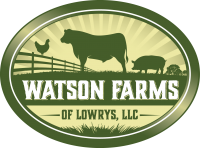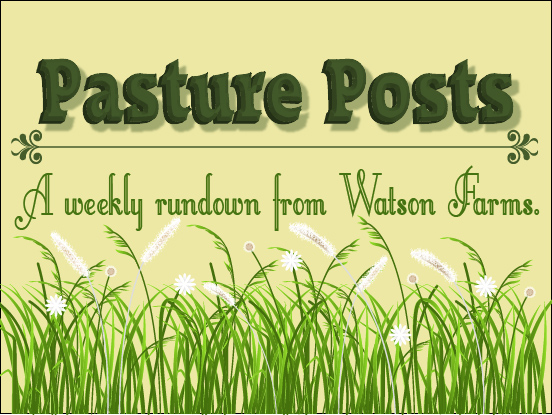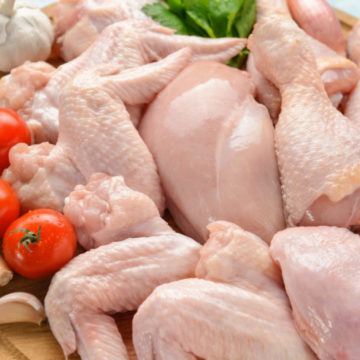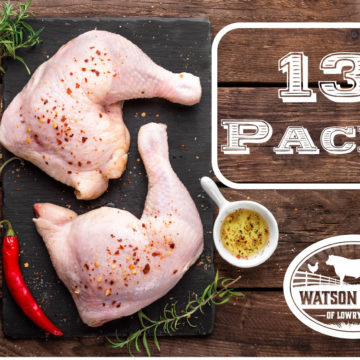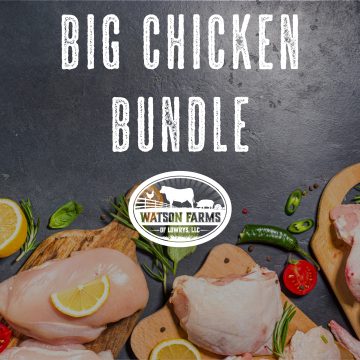Here’s the weekly roundup from Watson Farms and your direct connection to your farmer. Enjoy the latest edition of Pasture Posts where we show you what we were up to!
Why we process chickens on-farm
We are right in the middle of processing a flock of about 900 broiler chickens. With 5 people we can process about 235 birds from 6am to about 1-2pm. It definitely stretches us thin on these processing days, but it’s the only way we see to actually have a chance at making a profit from our pastured broiler enterprise. We also believe that our small abattoir can do a better job than the other two USDA plants that we have used in the past. We’re not being arrogant in saying that, but we’ve actually seen the difference in our birds and birds from these other plants firsthand. We haven’t had any issues with these other plants that rendered our birds inedible or anything like that, but rather the issues were things like a few extra feathers on the birds or too many packages that lost their seal. Whatever the issue is, we generally lose sales as a result.
So in this issue, we thought it would be a good idea to give you a quick overview about why we currently choose not to use a USDA facility for our chickens.
- Distance – for us transportation can be a huge drain on the resources and a source of animal stress for a pasture based farm – especially enterprises that struggle with economies of scale like pastured chickens tend to do.
We don’t mind transporting birds an hour or two, but we are about 3 hours away from the closest facility and about 4 hours away from the next closest. Chickens do best when hauled at night due to cooler temperatures and easier handling. The farther the drive is the more that can go wrong, so the more time we have to build in to these trips. This translates into driving a good part of the night before the actual processing day.
Weather over these long distances also stresses the birds. Rain, heat, and cold all add undue stress to the whole process.
Keep in mind as well that it often requires three separate trips to a chicken processor in order to finally get the product back to our freezers: one to haul the live birds in coups, one trip a day or so later to pick up the empty coups (unless our driver sits idle for a good part of the day waiting to retrieve the coups the same day), and one trip back with a refrigerated vehicle to retrieve the final product.
The Tysons and Perdues of the world often have mega-processing plants relatively close to the farm, and they are hauling 20-25 ton loads to and from these plants. These shorter hauls and larger loads are part of why factory-farmed chicken can be so cheap. There’s also a ton of other shortcuts these companies take to make an artificially cheap product, but that is a discussion for another day.
So what’s the distance to our on-farm facility? About a half mile.
- Less Stress – This has a lot to do with distance, but it’s easy to see that the birds are far less stressed when processed on our farm.
We catch the birds literally minutes before we dispatch the first one. No hours-long ride in the rain or cold wind. We keep them under shelter until dispatching where we can monitor their stress and add fans if heat is an issue.
The birds are in the coups the absolute minimum time necessary. This maximizes the time that they are on pasture in their natural environment which they enjoy much more than a coup.
- Direct oversight – We love the fact that when we process on-farm we can oversee and participate in the process directly. Every team member handles birds by hand and knows when we find something abnormal (which is very rare). Each team member shares the responsibility of making sure that we are only putting out the best product possible for our customers. We also have one person who is fully dedicated to inspecting and rinsing the dressed chickens. This allows them to devote their full attention to attaining the aforementioned goal.
We don’t feel as though this amount of individual responsibility exists in USDA plants, which could lead to recalls such as the one from a plant in Indiana or this one from Tyson just to name a couple recent ones.
- Cost – Small USDA plants have to charge a relatively high amount per bird in order to make the whole thing work for them. I had a fellow farmer tell me recently that his average processing cost per bird at a USDA facility was approaching $10. This would be unsustainable for our farm unless we greatly raised prices. We strongly resist doing that, so we have chosen to process on-farm in order to control costs.
So this list gives you a few key reasons we process chickens on-farm right now. We hope that greater access to USDA facilities will become a reality as entrepreneurs seize the opportunity to fill a need. Until then, we will do our best to secure the labor and other resources to do it ourselves in order to provide our customers with pastured chicken products they can feel good about feeding their families. Thanks for investing in a farm who sees value in raising and processing animals right.
Upcoming Tour
There’s a lot more that we can show you in person! Take advantage of the tour day set for Saturday, August 28 at 10am.
Make plans now to bring the family! The hayride will be covered with a tarp to provide some shade as we take a ride through the pastures. Slots are limited so go ahead and reserve your spot! Kids 5 and under are free. Herd Members and their immediate family also receive one free tour per year!
Product Spotlight
As you might guess, with all the chicken processing we’re doing lately, we’ve got plenty of premium pasture raised chicken in stock. Stock up with these handy bundles below while saving money!
We re-use packaging!
You can help us reduce our carbon footprint by returning your CLEAN egg cartons and meat boxes.
The main reason that we switched to plastic egg cartons a while back was because they are so much more durable than paper which could only be used once. They also protect the eggs much better!
So if you have some egg cartons or boxes to return, you can just place them on your porch on your home delivery day. Farm pickup customers can, of course, drop them off when you come to pick up your new order.
Thanks for helping us re-use our packaging!
Referral Program
If you enjoy our products please consider passing the word along to your neighbors, friends and family! We don’t spend a lot of money of advertising but rather depend on customers like yourself to advertise for us if they are amazed by our products and customer service.
All you have to do is refer someone to us and when they place an order for the first time they will get a link to a form where they can say who referred them. You and the new customer will receive a $15 credit! So make sure they tell us your name. Hit the button for more info!
Order Deadlines
Charleston: 12 noon Mondays
GSP: 12 noon on Wednesdays
Charlotte/Rock Hill: 12 noon Fridays
Farm Pickup: Please wait until you receive an email stating that your order is ready to be picked up (usually 1 business day from when you place your order). Farm Pickups will now be done during our store hours:
- Monday, Tuesday, Thursday, Friday: 10am to 6pm
- Saturday: 10am to 2pm
- Closed Sunday and Wednesday
Did you know that we have a webpage that displays all the reviews we have received?
Check it out!
Check out this ⭐⭐⭐⭐⭐ review:
“Love Watson Farms! Enjoy their beef and chicken with a bi-monthly subscription. It’s always a pleasure to pick up directly on the farm. Great customer service and affordable. Highly recommend.”
We would greatly appreciate it if you would be kind enough to leave us a review. It helps first-time customers purchase with confidence.
Thanks again for being partners in this endeavor of local, pasture-raised proteins that has truly transformed our farm. We look forward to continuing this transition while serving you long into the future.
Sincerely,
The Watsons
Pasture Posts is written by Matt Watson.
